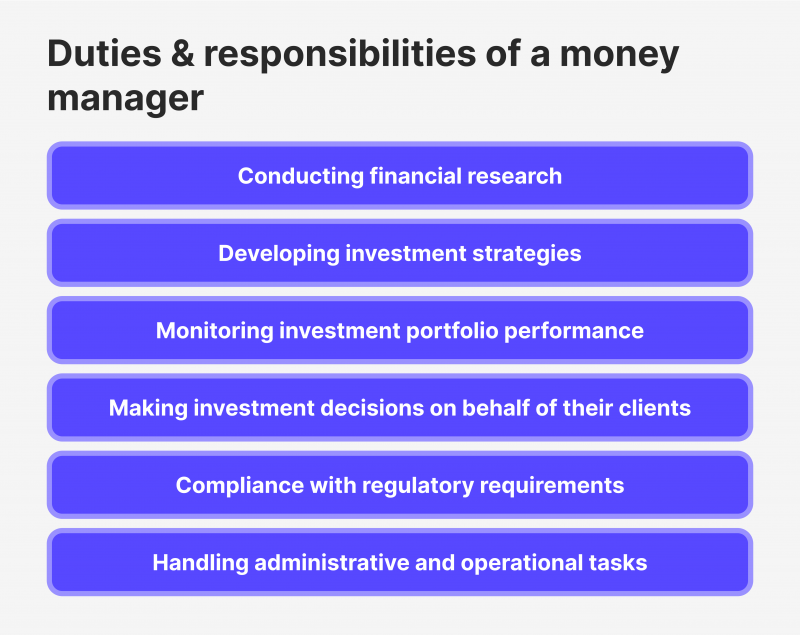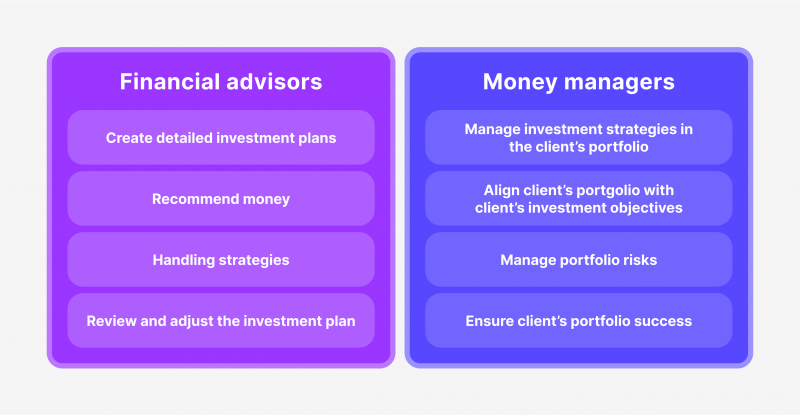What Does a Money Manager Do ? Financial Advisor vs Money Manager
What Does a Money Manager Do?
Money managers are responsible for developing investment strategies that align with client’s financial goals and risk tolerance, implementing and adjusting these strategies over time as market conditions change.
They also conduct research to identify investment opportunities and assess market trends, economic conditions, and other factors that may impact investment performance.  Money managers make investment decisions on behalf of their clients, using various techniques and tools to assess opportunities and manage risk. They regularly monitor investment performance and may adjust clients’ portfolios to optimise returns or mitigate risk.
Money managers make investment decisions on behalf of their clients, using various techniques and tools to assess opportunities and manage risk. They regularly monitor investment performance and may adjust clients’ portfolios to optimise returns or mitigate risk.
They work closely with clients to understand their financial goals, provide regular performance updates, and advise on financial planning and other financial matters.
Portfolio managers must comply with regulations and industry standards set by the Securities and Exchange Commission (SEC) and the Financial Industry Regulatory Authority (FINRA). They may also manage operational and administrative tasks related to managing clients’ investments, such as maintaining records, processing transactions, and preparing reports.
Financial assistance managers offer clients various services, including budgeting, tax planning, asset monitoring, portfolio management, and currency trading. They monitor income expenses, save money, evaluate transactions, and file taxes.
They also provide personalised services for customers, supervise their holdings, and help investors maintain and diversify their portfolios. Additionally, they assist in assessing fluctuations and risks associated with foreign currency.
How Do Money Managers Get Paid?
Money managers offer money management services to clients for a fee, usually as a percentage of the account value, either by creating a customised portfolio or maintaining a set fund. The former is more common in retail banking, while the latter is more common in large-scale money management like mutual funds or hedge funds.
Compensation for money managers can vary, with some charging a one-time or periodic fee while others charge a commission-based fee, such as 20% of profits.
More commonly, money managers charge a fixed fee and a variable fee, such as the 2 and 20 fee structure, which combines a 2% fixed fee with a 20% commission. This structure may increase incentives to maximise investor returns and reduce moral risks.
Financial Advisor vs Money Manager
Financial advisors and money managers are complementary roles, but nevertheless, they have some distinctions.
Financial advisors, also known as wealth managers or investment advisors, understand clients’ financial needs and create detailed investment plans to help them achieve their goals.
A financial advisor should understand a client’s financial life, including investments, debt, and cash flow needs, as well as their goals. They should create a detailed investment plan, recommend money management strategies, and regularly review and adjust the plan to ensure they are best suited for the client’s individual plan. Money managers, on the other hand, focus on managing the strategies in a portfolio, ensuring the portfolio’s success. Money managers should consistently meet expectations, such as managing investment portfolios aligned with investment objectives, managing risk appropriately, avoiding turnover, and operating transparently to maintain their reputation.
Money managers, on the other hand, focus on managing the strategies in a portfolio, ensuring the portfolio’s success. Money managers should consistently meet expectations, such as managing investment portfolios aligned with investment objectives, managing risk appropriately, avoiding turnover, and operating transparently to maintain their reputation.
Why Hire a Money Manager?
Money managers are beneficial for non-professionals in capital markets and finance, as they can manage money effectively and provide a sense of safety for clients.
Despite the potential risks associated with investing in capital markets, money managers’ fiduciary responsibility ensures the money is in good hands, providing a sense of security for clients.
Managing assets on your own can be time-consuming, especially for those with multiple investment accounts or a large portfolio. Money managers have advantages in investment choices due to their training and access to valuable information like analytical data, research reports, financial statements, and modelling software.
These professionals can make informed decisions that are unavailable for an average investor. Money managers can help investors understand how to effectively use their money to achieve financial goals, which is especially beneficial for those investors who have just started their journey in finance.












![[FAILED] Engage2Earn: McEwen boost for Rob Mitchell](https://cdn.bulbapp.io/frontend/images/c798d46f-d3b8-4a66-bf48-7e1ef50b4338/1)

















![[ℕ𝕖𝕧𝕖𝕣] 𝕊𝕖𝕝𝕝 𝕐𝕠𝕦𝕣 𝔹𝕚𝕥𝕔𝕠𝕚𝕟 - Is Trump Dying? Or Only Killing The Market?](https://cdn.bulbapp.io/frontend/images/a129e75e-4fa1-46cc-80b6-04e638877e46/1)








